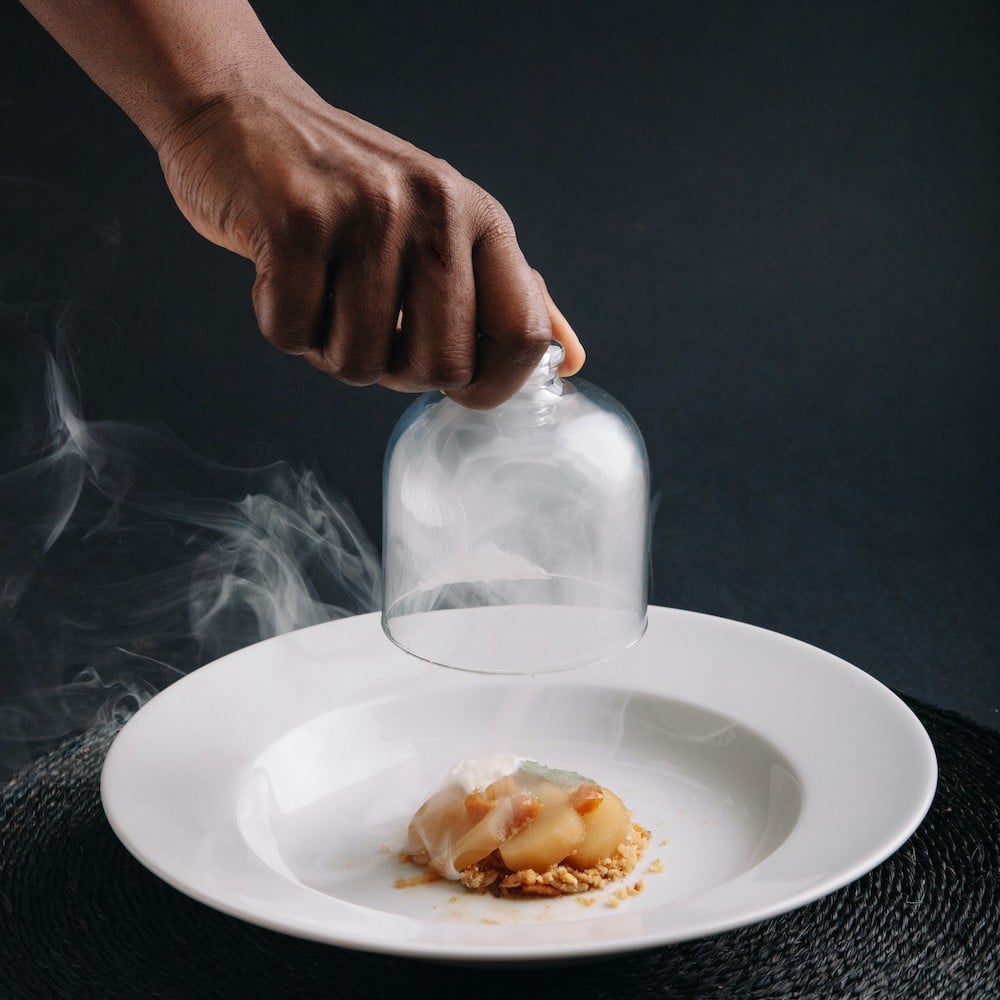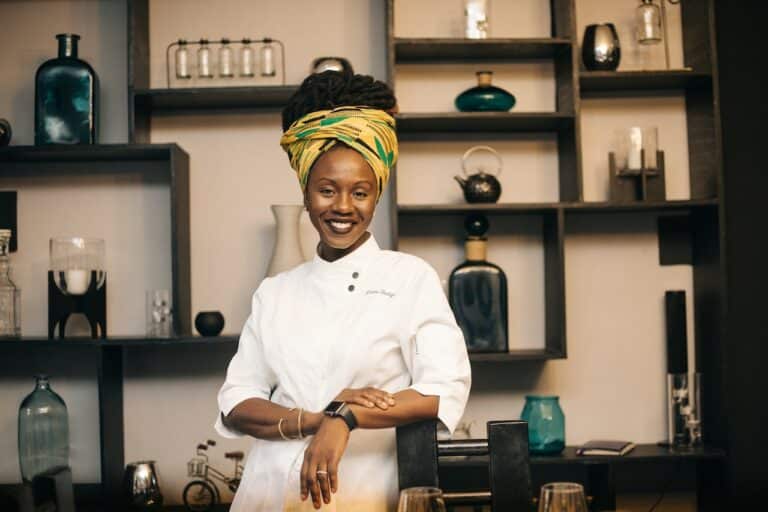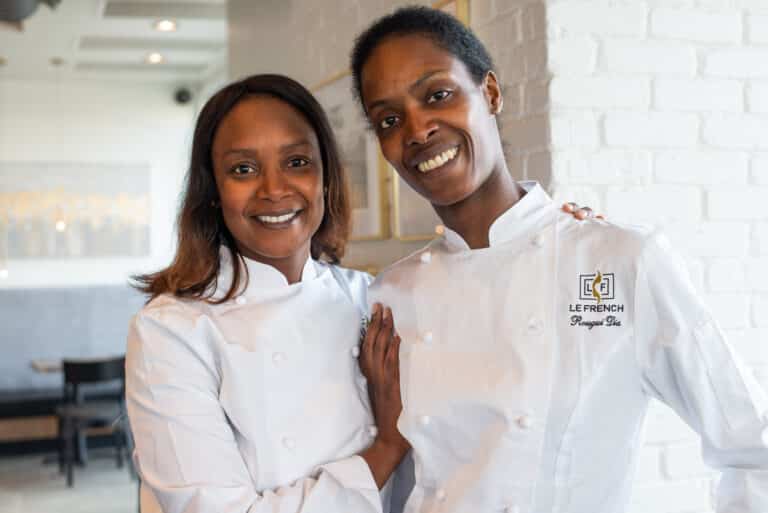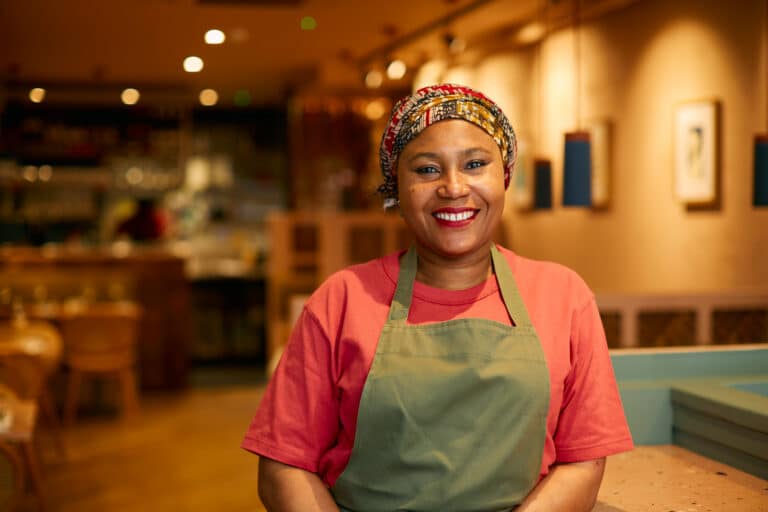|
Getting your Trinity Audio player ready...
|
Selassie Atakika is doing her part to preserve Africa’s culinary heritage.
Bringing indigenous ingredients to the forefront and experimenting with flavor profiles have been the backbone of chef Selassie Atadika’s success. The Ghanaian chef has been offering African cuisine to global audiences since 2014 via nomadic dining experiences at her restaurant Midunu in Accra.
Born in Ghana, Atadika was raised and went to school in America. Her family still resides in the U.S. while she has moved back. After finishing graduate school, she worked for the United Nations before completing coursework at the Culinary Institute of America.
“I know the flavors of the continent. I want to have the vocabulary and fundamentals, so I did that course to apply some of those techniques and ideas into the food that I know and love,” she shares.
After a three-year stint in Senegal and starting a pop-up with two friends, she chose to express her voice in terms of food and moved to Ghana to establish Midunu, which means “come let’s eat” in Ewe, a language spoken in southeastern Ghana.
Midunu, Come Let’s Eat
As with other businesses in the hospitality industry at this time, the Midunu kitchen is closed for the safety of staff and guests, considering most dining experiences are communal or dine-in. But Atadika’s handmade chocolate bonbons are still available for door-to-door no-contact drop-off within Accra, and she is considering expanding to international markets next.
There are currently 20 flavors under four collections and each flavor is named after a woman “because somehow women are the custodians who get written out of a lot of our chef stories.”
- Chefs Tips for Bringing the World into Your Kitchen
- NYC Chef Maame Boakye Dares to Dream Big on Chopped and in Ghana
She is hoping to use the chocolates as an opportunity for people to try the flavor profiles of the land and get excited about chocolate, not just cocoa, from Ghana. Initially, Atadika saw only foreigners at her dinners at Midunu, but the last two years have brought more locals in, creating enough demand to also offer a weekly tasting menu.

Getting the business going has presented challenges. One was the idea that as a Ghanaian, why would one go out to eat Ghanaian food and spend a lot of money on it? Another was a lot of the executive chefs in local hotels and restaurants are not Ghanaian, so being a Ghanaian chef in Ghana was an alien notion.
Add to that the fact that buffets are the norm in the country, while Midunu serves plated or family-style meals to keep people at the table having a conversation about what’s on their plate. The most pressing challenge she discovered while working with the tasting menu is finding ingredients that don’t have a value chain.
For instance, her menu for April included cashew apples for which she had to make special arrangements with a farmer and the transportation cost ended up being more expensive than purchasing the actual fruit.
Back to the Basics
“I always wanted to highlight our indigenous ingredients and things that were underutilized,” says Atadika. Her definition of new African cuisine is where culture, community and cuisine intersect with sustainability, economy and environment. “I have always been conscious of how I create an economy for the local farmer struggling because of dying imports, how I select ingredients that will do well with climate change, so we are respecting our environment.”
Aligned with those efforts, last year Atadika started the Midunu Institute, a nonprofit with a focus on consumer health and awareness and the use of indigenous African ingredients.

The Midunu Institute is currently working on a project designing a seed library, encouraging people to plant at home on their balconies what they can to supplement nutrition. “Our modern lifestyles have forced us to move quickly, the opportunity we have now is to slow down,” she says. Intergenerational sharing of food history and culture isn’t happening to the same extent as in the past, with people moving to urban areas and not being in kitchens as much as they used to be.
“The silver lining right now is everyone is at home, so how do we focus on our nutritional education and cooking knowledge. How do we actually become a bit more self-sustainable at home, in communities and as a nation by eating what actually is from here, because we don’t know what the supply lines internationally are going to look like in a few months.”
Moving to the Mainstream
In preaching what she practices, Atadika has worked locally and globally, sharing her prowess. She hosted a lunch for local chefs at Midunu to introduce some of the ingredients she uses and share how to get them into their dining rooms and kitchens. She has done a few dinners at the esteemed James Beard House in New York, where her food was well received.
RELATED: Fulani Cuisine Takes the Stage on Culinary Africa’s Delectable Buffet
“The fantastic thing about these is they are tasting things they didn’t know existed…some of the spices and ingredients don’t even have English names. There are a lot of preconceived notions that go out the window once you can taste the food.”

For the big picture, Atadika sees some immediate and long-term concerns for the industry as a whole. “What will the modern restaurant look like coming out of this [pandemic]? How do we create food systems that are more sustainable and equitable on so many levels going beyond the restaurants and farmers,” she shares.
Another concern Atadika has been grappling with is how to stay true to your cuisine without resorting to “interlocutors to access our food.” She says, “There are so many gatekeepers, somebody to vet you. How do we get away from people needing someone who looks like them to approve before they accept that your food is good too? Every culture has good food, but because you are not familiar with the flavor profiles does not make it not delicious.”
For more information, visit her website or Midunu Institute and follow along on Instagram.










